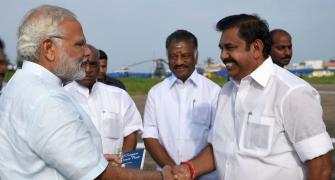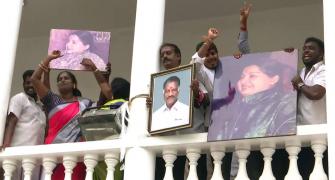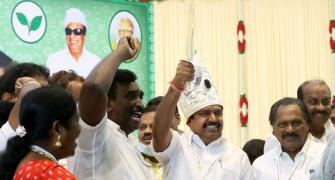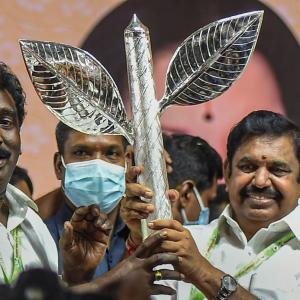There is a sudden realisation in party circles that prolonged court cases could damage its standing, both among the cadres and voters, observes N Sathiya Moorthy.
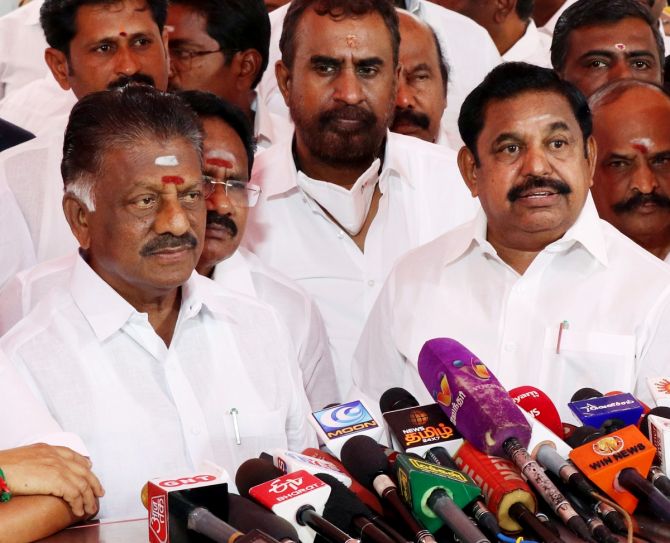
Independent of the claims of the 'majority' EPS faction that this was not the final, Wednesday's single-judge order of the Madras high court could trigger fresh thinking in the four factions of Tamil Nadu's Opposition All India Anna Dravida Munnetra Kazhagam to reunite to give a tough fight to the ruling DMK, as always -- and also 'to push back the BJP usurpers' to where they belonged, to fifth place in the state's electoral politics, after the Congress and the PMK, so to say.
In effect, Justice G Jayachandran ordered a status quo ante, after maintaining that the AIADMK's July 11 general council meeting that 'unanimously' elected former chief minister Edappadi K Palaniswami (EPS), at present Leader of the Opposition in the state assembly, as voidable under the law.
Accordingly, three-time former CM O Panneerselvam (OPS) returns as the party coordinator and EPS having to return to work with/under him as joint coordinator.
The two posts were created after they patched up their differences to oust V K Sasikala Natarajan, on whom they had 'thrust' the party general secretary's post following J Jayalalithaa's death.
The post fell vacant after Amma, as cadres loved to adore Jaya as, became the third chief minister to die in office (December 2016) after her mentor and party founder M G Ramachandran, and his political guru, the late C N Annadurai, founder of the DMK.
The court order clarified that a general council meeting will become valid, if and only if the two leaders called it together, or when a third of the general council members sought one.
The judge also indicated that the court would be ready to appoint a 'commissioner' to oversee the general council or to call and conduct one.
Prima facie, the single judge verdict can be appealed against, and this is what the EPS faction leader and former minister D Jayakumar, himself a law graduate, said later.
While that is true and is also a possibility, the verdict has brought OPS back into legal reckoning, though not necessarily political reckoning, where his support base is woefully short of that of his rival.
But that all could take time, and much more water could flow under the bridge during the period, making the EPS faction more uncomfortable than what the high court verdict has done now.
There is also the distinct possibility of the final appeal verdict going against the EPS camp, as in the high court, where it returned after the Supreme Court had told the sulking OPS faction to go back to where it began -- and where alone it should lie at that point in time.
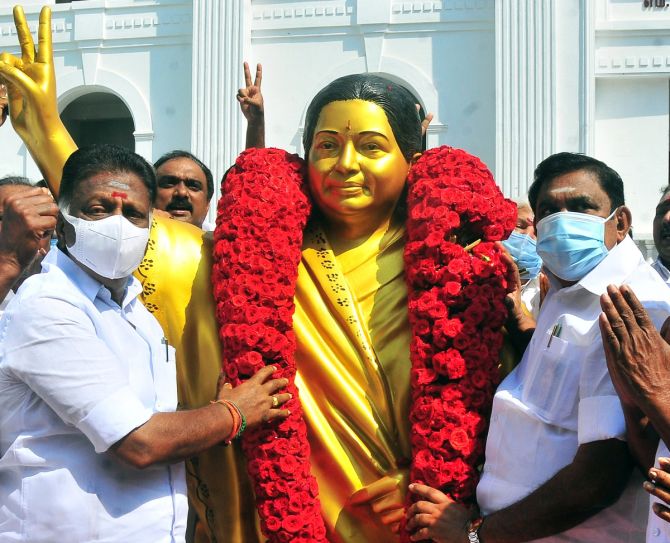
The alternative could be for EPS to accept the high court verdict as a strategy and acknowledge OPS as the party coordinator as before the controversial June 23 general council meet that was upheld by the Supreme Court -- where no substantive decision was taken.
There is the option for the faction to then get a third of the general council members (most of them were with him at the last head-count) to seek another general council, where EPS could still be elected general secretary after abolishing the posts of coordinator and joint coordinator. Or, so would it seem -- but for the fact that the party constitution says that the two top leaders should together finalise the agenda. That is mostly unlikely to happen.
There is a sudden realisation in party circles, independent of the factions involved, that prolonged court cases of the kind, going all the way up to the Supreme Court, could damage its standing, both among the cadres and the voters.
AIADMK veterans and cadres alike see a new opening ahead of the Lok Sabha polls of 2024, in what they call the lacklustre performance of Chief Minister M K Stalin's DMK government.
They also claim that the people are upset with the DMK cadres 'going back' to their old ways of high-handedness in public places like eateries and also in party-controlled municipal and panchayat councils.
According to some of them, Stalin as chief minister and party president is unable to, rather than unwilling to, control increasing incidence of rowdyism by DMK cadres.
Nor has he been able to ensure that his ministerial colleagues, especially those with his kind of seniority in the party or above, fell in line with the kind of internal discipline in governmental affairs that he wanted to instill.
The same applies to top bureaucrats, whose image as honest officials is not matched by their efficiency and performance -- or, so go internal AIADMK observations by the two factions.
Against this, they claim that Edappadi's leadership (2017-2021) was firm and decisive, and the chief minister had 'put the bureaucracy in its place'.
Yet, they do not have a direct answer to the question, why then did the Tamil Nadu voter hand down the party a severe blow, that too in the company of the BJP and PMK allies in the Lok Sabha polls of 2019, and followed it up with a relatively lesser punishment in the 2021 assembly elections, which the PMK contested on its own.
As if for explanation for past poll reversals, AIADMK men attribute it to the Tamil voter's continuing and at times growing antagonism to the ruling BJP ally at the Centre, and Prime Minister Narendra Modi's image as a leader unwilling to curb and control hard-line Hindutva elements in the party, elsewhere in the country.
As a more substantial justification, they point to pan-Tamil socio-administrative issues of the NEET kind where even AIADMK cadres were peeved at the party's twin leadership and state government kow-towing to the BJP's official line, or that of the Centre.
So much so, even when the AIADMK government opposed NEET, the leadership could not convince the cadres and voters that they were serious and sincere about it.
In this context, the AIADMK factions are upset also with Governor Ravindra Narayana Ravi, as much as the rival DMK too is.
They feel that Ravi's stubborn approach to pan-Tamil issues as NEET and also constant usurping of traditional government powers in university administration, were seeking to render the party -- hence the Dravidian ideology -- as much irrelevant as under predecessor Banwarilal Purohit.
Some of them also feel, like their DMK rivals and the latter's multiple allies, that the governor had turned the Chennai Raj Bhavan into a state BJP stratagem headquarters, and the incumbent Ravi's 'pro-Hindutva speeches' as provoking a majority of state voters.
Veteran AIADMK leaders, older and senior to OPS and EPS, Sasikala and T T K Dinakaran, recall the good old days when Congress-appointed governors used to act like this -- but not under then BJP prime minister Atal Bihari Vajpayee.
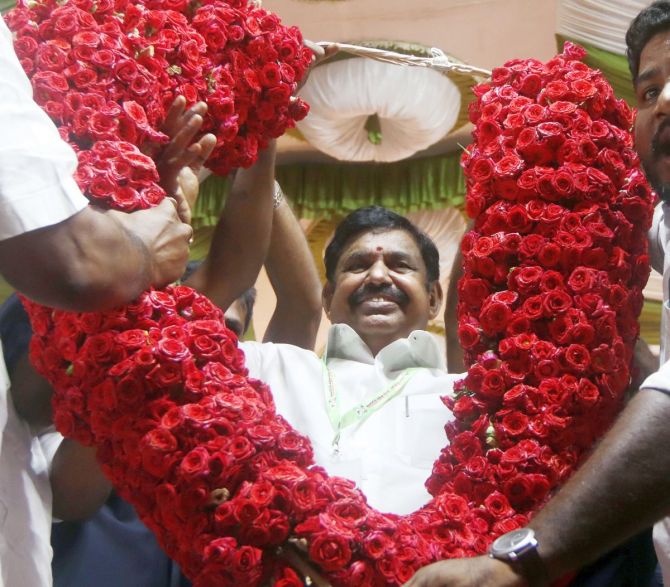
More than at any time in the past, the AIADMK factions are upset with state BJP President K Annamalai for trying to make hay when the AIADMK ally was going through internal convulsions.
They pooh-pooh the BJP's claims, by cleverly interpreting the urban local bodies poll percentages of February, to say that the party was the third largest in the state after the two Dravidian majors.
That had upset the PMK, which was being seen as the third largest especially after actor Vijaykanth's DMDK lost its steam in the previous decade.
AIADMK leaders and cadres alike instinctively feel that Tamil Nadu is a 'Dravidian state' and electoral politics was centred on DMK-AIADMK competition/rivalry. But they are not any more sure if the BJP ally ruling the Centre would want to leave it at that, or misuse the current convulsions in their party to render it less significant than at present -- so as to try and take its place.
To them, the BJP just now is not as trustworthy an ally as the Congress used to be in its hey day.
They are also aware that given the BJP's hard-line Hindutva image that had rubbed off on their party, the Congress, even with its limited electoral prospects -- but better compared to the BJP -- would not want to jump ship.
Behind all these, Wednesday's high court order has given them newer worries about the appeals dragging on until the Lok Sabha polls one-and-a-half years hence, and about the added possibility of the Election Commission having to 'freeze' the party's 'Two Leaves' poll symbol, and even the brand name and flag, pending the final disposal of all the cases that might come up before multiple fora.
Learning from the post-MGR 1990 assembly polls, they are convinced that without his 'Two Leaves', the party did not stand a chance even now.
While the temptation for hotheads in the EPS camp is to go all the way up to the Supreme Court, saner voices wanted peace, as the continuance of the current split, however minor on the cadre and legislative sides, could be demoralising at election time.
Such a construct leads to the possibilities of the party's traditional vote-bank splitting on caste lines, and denying the southern Mukkulathore community votes of OPS, which used to be a major mainstay during Jayalalithaa's time along with EPS's western Kongu Vellalar community vote-bank.
It is in this context that some veterans are talking about the need for reunifying the party to save the day for the future.
According to them, it should involve not only the OPS and EPS factions but also other estranged groups like those under V K Sasikala and her nephew T T V Dinakaran -- who parted company a long time ago.
The sentimental among them feel, though without ground-level justification, that the party lost the 2019 and 2021 polls also because EPS and OPS together had 'stabbed' Sasikala in the back when she was undergoing a four-year prison term in a criminal case in which Jaya was the prime accused until death, and had robbed her of the party general secretaryship -- and all linkages, after EPS especially owing his chief ministership to her largesse.
Going beyond it, they feel that between now and the Lok Sabha polls, they should unify all factions and revitalise the AIADMK to earlier levels, to be fighting fit to take on the DMK alliance in the Lok Sabha polls of 2024 and assembly elections two years later.
Without which, they are equally convinced, that the AIADMK's future may dim by the day -- giving the BJP ally an edge that it had not worked for.
Yet, the ambitions for reunification are fine on paper, but in practical terms, for the four factions to work together, they may need a fifth person as general secretary, but elected unanimously by them all.
It will be difficult for each one of them to accept it, jointly and severally -- and more so for EPS, who had long since concluded that whether in office or not, he was the boss and he did not have any internal competition, and would not suffer any, either!
N Sathiya Moorthy, veteran journalist and author, is a Chennai-based policy analyst and commentator.
Feature Presentation: Rajesh Alva/Rediff.com

